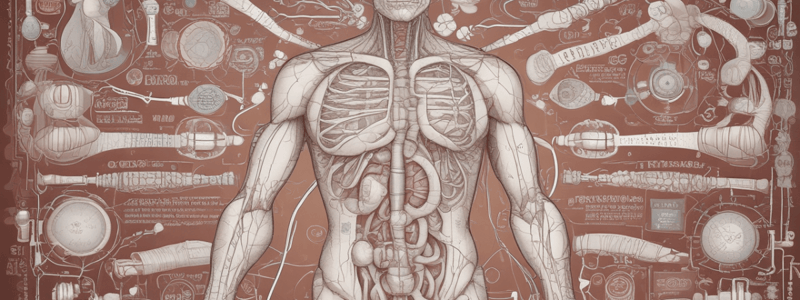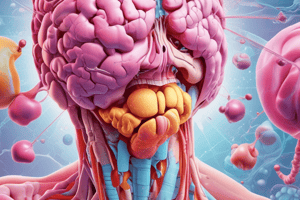Podcast
Questions and Answers
What is the primary function of hormones in the endocrine system?
What is the primary function of hormones in the endocrine system?
- To stimulate digestion
- To regulate various bodily processes (correct)
- To regulate body temperature
- To produce energy
What is the role of the pituitary gland in the endocrine system?
What is the role of the pituitary gland in the endocrine system?
- To convert glycogen into glucose
- To regulate blood sugar levels
- To stimulate other endocrine glands (correct)
- To produce digestive enzymes
What is the function of insulin in the body?
What is the function of insulin in the body?
- To raise blood glucose levels
- To stimulate the liver to convert glycogen into glucose
- To regulate blood pressure
- To allow glucose to enter individual cells (correct)
What happens when stored glycogen levels are depleted?
What happens when stored glycogen levels are depleted?
What is the result of hyperthyroidism?
What is the result of hyperthyroidism?
What is the function of calcitonin?
What is the function of calcitonin?
What is the main characteristic of type 1 diabetes?
What is the main characteristic of type 1 diabetes?
What is the term for a condition that may precede the development of type 2 diabetes?
What is the term for a condition that may precede the development of type 2 diabetes?
Which of the following is NOT a diabetic emergency?
Which of the following is NOT a diabetic emergency?
What is the term for a glucose intolerance that can occur during pregnancy?
What is the term for a glucose intolerance that can occur during pregnancy?
What is the term for an abnormally high blood glucose level?
What is the term for an abnormally high blood glucose level?
Flashcards are hidden until you start studying
Study Notes
• The endocrine system influences every cell, organ, and body function, producing and secreting hormones that regulate various bodily processes.
• Endocrine disorders can be caused by either hypersecretion or insufficient secretion of a gland, leading to overactivity or underactivity of the target organ.
• The pituitary gland, located at the base of the brain, secretes six hormones that stimulate other endocrine glands, playing a crucial role in maintaining homeostasis.
• The thyroid gland secretes hormones in response to the pituitary gland, including calcitonin, which helps maintain normal calcium levels in the blood.
• The pancreas is both an endocrine and exocrine gland, secreting digestive enzymes into the duodenum and hormones such as insulin, glucagon, and somatostatin into the bloodstream.
• Insulin allows glucose to enter individual cells, regulating blood sugar levels, and stimulating the liver to store excess glucose and skeletal muscles to store glycogen.
• Glucagon raises blood glucose levels by stimulating the liver to convert stored glycogen back into glucose, and when stored glycogen levels are depleted, the cells begin to metabolize fats, proteins, and other non-carbohydrate sources.
• Hyperthyroidism and hypothyroidism are two serious endocrine disorders that display overactivity or underactivity of the thyroid gland, respectively.
• Diabetes is a metabolic disorder characterized by hyperglycemia, polyphagia, polydipsia, and polyuria, resulting from abnormal insulin secretion or resistance.
• Diabetic emergencies are common endocrine emergencies, including diabetic ketoacidosis, hyperosmolar hyperglycemic non-ketotic syndrome, and hypoglycemia.
• Two types of diabetes exist: type 1 (formerly known as juvenile onset diabetes) and type 2 (formerly known as adult onset diabetes), with type 1 being characterized by autoimmune destruction of pancreatic beta cells and type 2 being characterized by insulin resistance.
• Pre-diabetes is a warning sign that may precede the development of type 2 diabetes, characterized by above-normal blood glucose levels or hemoglobin A1c levels.
• Gestational diabetes is a glucose intolerance that can occur during pregnancy, increasing the risk of developing type 2 diabetes in the future.
Studying That Suits You
Use AI to generate personalized quizzes and flashcards to suit your learning preferences.




